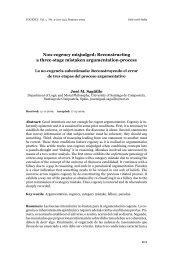Cogency v2 n2
Cogency v2 n2
Cogency v2 n2
Create successful ePaper yourself
Turn your PDF publications into a flip-book with our unique Google optimized e-Paper software.
Wittgenstein and the Logic of Deep Disagreement / D. M. GODDEN & W. H. BRENNER<br />
which might be called “deep.” Before doing this, though, we review and,<br />
from a Wittgenstenian perspective, critically evaluate the existing accounts<br />
of the role of reasons in resolving deep disagreements.<br />
5. Prospects for the Rational Resolution of Deep Disagreements<br />
Fogelin’s respondents can be divided into optimists and pessimists according<br />
to whether they find there to be good prospects for the rational resolution<br />
of deep disagreements.<br />
5.1. Theoretical and Methodological Reasons for Optimism<br />
Fogelin’s initial respondent, Lugg (1986) argued that even in cases of deep<br />
disagreement, non-rational persuasion is not the only means available to<br />
the disputants. Instead, he offers an account, ably described by Turner and<br />
Wright (2005: 31), whereby “interlocutors can build to a common understanding<br />
by retreating to neutral ground, untangling, coordinating and synthesizing<br />
ideas, examining assumptions reviewing alternative proposals and<br />
negotiating conflicting demands.” Further, Lugg reminds us that in many<br />
cases the rational resolution to a disagreement may be suspension of judgment<br />
(and perhaps an accompanying resumption of inquiry) rather than<br />
the endorsement or rejection of the claim(s) at issue.<br />
Ultimately, Lugg (p. 50) seeks to wrest us of Fogelin’s picture that “argumentative<br />
exchanges must be always normal (and hence rational) or<br />
nonrational (because abnormal).” To this end, Lugg recommends that we<br />
take a new perspective on the role of agreement in argumentation. “What<br />
we happen to agree upon is important because it provides a starting point<br />
for discussion between us, not because it dictates what the outcome of our<br />
discussion should be” (Lugg, p. 49). Agreement, for Lugg, is best conceived<br />
of as a goal or accomplishment of argumentation, rather than a necessary<br />
starting place or precondition of argumentation.<br />
Taking a rationalist, epistemic approach Feldman (2005: 19) construes<br />
deep disagreements as “disagreement[s] about a framework proposition.”<br />
The kernel of Feldman’s argument is his denial of the claim that “framework<br />
propositions are somehow beyond rational assessment” (p. 21) which<br />
51








